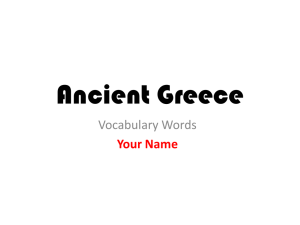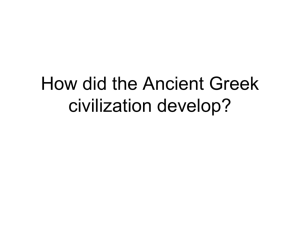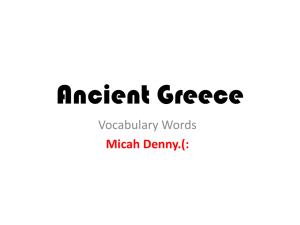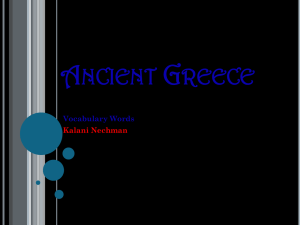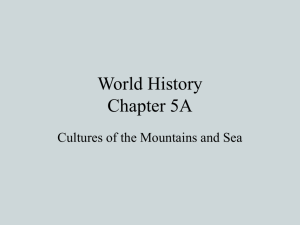Greece reading guide questions and answers 1
advertisement
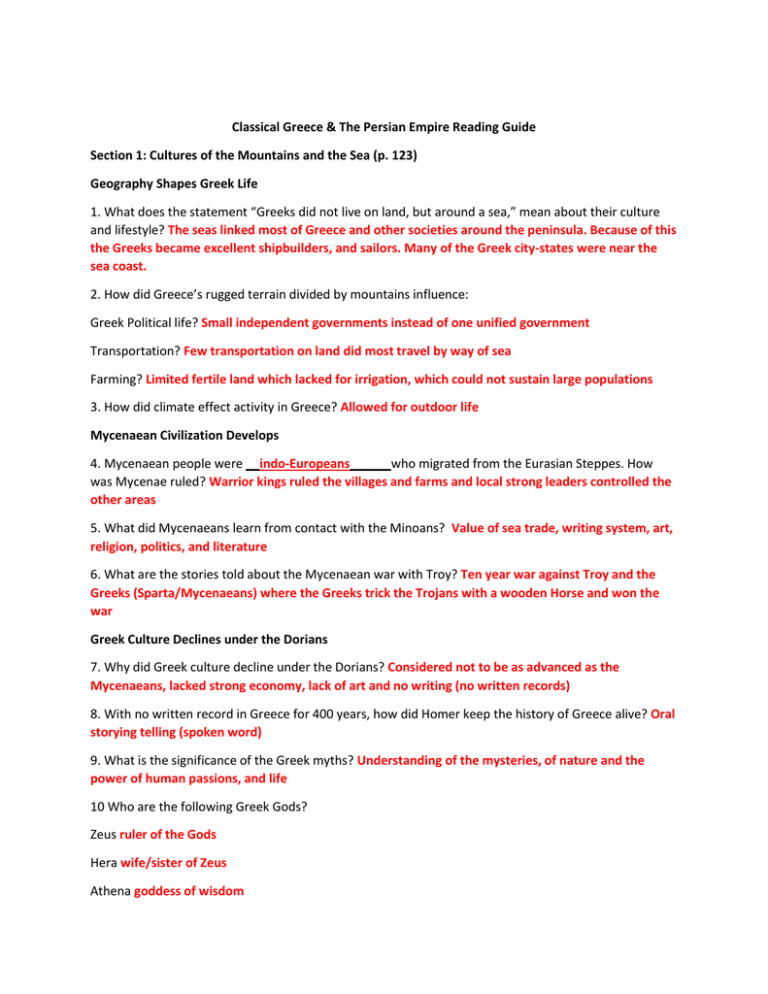
Classical Greece & The Persian Empire Reading Guide Section 1: Cultures of the Mountains and the Sea (p. 123) Geography Shapes Greek Life 1. What does the statement “Greeks did not live on land, but around a sea,” mean about their culture and lifestyle? The seas linked most of Greece and other societies around the peninsula. Because of this the Greeks became excellent shipbuilders, and sailors. Many of the Greek city-states were near the sea coast. 2. How did Greece’s rugged terrain divided by mountains influence: Greek Political life? Small independent governments instead of one unified government Transportation? Few transportation on land did most travel by way of sea Farming? Limited fertile land which lacked for irrigation, which could not sustain large populations 3. How did climate effect activity in Greece? Allowed for outdoor life Mycenaean Civilization Develops 4. Mycenaean people were __indo-Europeans______who migrated from the Eurasian Steppes. How was Mycenae ruled? Warrior kings ruled the villages and farms and local strong leaders controlled the other areas 5. What did Mycenaeans learn from contact with the Minoans? Value of sea trade, writing system, art, religion, politics, and literature 6. What are the stories told about the Mycenaean war with Troy? Ten year war against Troy and the Greeks (Sparta/Mycenaeans) where the Greeks trick the Trojans with a wooden Horse and won the war Greek Culture Declines under the Dorians 7. Why did Greek culture decline under the Dorians? Considered not to be as advanced as the Mycenaeans, lacked strong economy, lack of art and no writing (no written records) 8. With no written record in Greece for 400 years, how did Homer keep the history of Greece alive? Oral storying telling (spoken word) 9. What is the significance of the Greek myths? Understanding of the mysteries, of nature and the power of human passions, and life 10 Who are the following Greek Gods? Zeus ruler of the Gods Hera wife/sister of Zeus Athena goddess of wisdom Section 2: Warring City – States (p. 127) Rule and Order in Greek City – States 11. What is a polis and how are they important in Greece? City-states fundamental political units in Greece What is an acropolis? Fortified hilltop where politics and other activities took place 12. Define the following types of Greek city – state governments. Monarchy rule by a King or Queen Aristocracy ruled by a small group of noble (rich) landowning families Oligarchy ruled by a few powerful leaders 13. What is a tyrant and how did they work for the citizens of Greece? Powerful leaders who seized or took control without the legitimacy (approval) of the people. Look at as leaders who work for the best interest of the people Athens Builds a Limited Democracy 14. How does democracy differ from earlier forms of governments in Greece? The citizens have the right to rule. The citizens participated directly in decision making at the top were the aristocrats but all citizens had a say in government policies and laws 15. What reforms did Cleisthenes bring about that moved Greece toward democracy? Increased the power of the assembly (able to summit laws for approval), created a council of 500 chosen at random Sparta builds a Military State 16. How did Sparta differ from other city-states? Political system was a military state: oligarchy 17. Messenians, after defeat by Sparta were forced to be Helots. What does this term mean? Peasants forced to stay on the land and work it (basically slaves) 18. Describe Sparta’s government: assembly; Spartan citizens that voted on proposed laws, elected officials voted on major issues, council of elders (30 older citizens who proposed laws) , five elected officials that carried out laws What parts of this are similar to the government of the United States? Similar to our legislative branch make the leas) and executive branch (carries out the laws) 19. What sacrifices did Spartans make to establish their military strengths? Individual expression, family life, pleasures/luxuries
